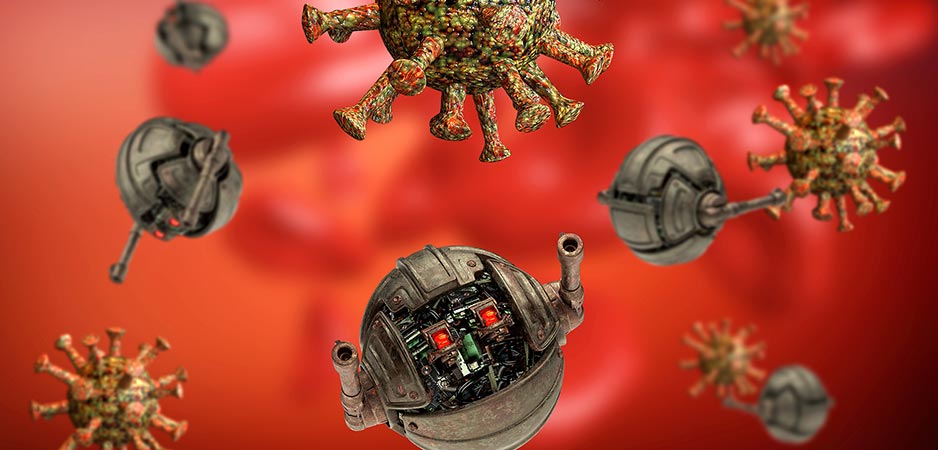Over the past few weeks, US President Donald Trump has been urging Americans to take hydroxychloroquine, which he touts as a “miracle cure” for the new coronavirus that causes the COVID-19 disease. Intrigued by the persistence of Trump’s claim, The Guardian has sought to uncover the origin of his apparent fixation on this exotic molecule currently used for the treatment of malaria and lupus.
The principal sources of Trump’s obsession appear to be Didier Raoult, a long-haired, bearded doctor in France; Elon Musk, the founder of Tesla; Oracle CEO Larry Ellison; and Fox News. Only one of those sources appears to be serious and well-informed since he’s a doctor. But Raoult has an unfortunate habit of expressing his nuanced description of the possible merits of experimental treatment in French, a language that Trump appears not yet to have mastered, which may explain the misunderstanding.
The Health Care Industry in the US Is at a Crossroads
Closer to home, Trump has the option of taking counsel from his own chief adviser, Dr. Anthony Fauci, who is widely considered to be well-schooled in the epidemiology of infectious diseases. Despite an Italian name, this doctor speaks English. Trump sometimes appears to listen to him and even defer to his judgment, though there are other times when he finds it prudent to exile the doctor from the podium, presumably to avoid contradiction or confusing his audience with mixed messages.
The Guardian comments on what appears to be a disagreement of interpretation: “Fauci, the country’s top infectious disease doctor, has repeatedly warned that there is no conclusive evidence to support using the drug Trump continues to recommend.” On March 24, when he was asked whether it should be considered a treatment for COVID-19, Fauci offered this laconic appreciation: “The answer is no.”
Here is today’s 3D definition:
Conclusive evidence:
Solid empirical proof, a determination that some politically naive scientists insist on having before making statements to the public, for fear of creating confusion. In contrast, politicians and hypermedia heroes tend to prefer, in terms of interest and utility, either inconclusive evidence or simply wishful thinking (alternative reality).
Contextual Note
For politicians, conclusive evidence has a nasty habit of creating embarrassment at the same time that it limits their margin of maneuver. For the media, conclusive evidence has the added drawback of reducing the level of suspense.
Even when virtually an entire scientific community admits that conclusive evidence is present — think of climate change — there’s the risk for the media that it may kill the life of a story that people want to continue hearing and worrying about day after day, week after week. Aware of the risk that their audience may tune out, all respectable media outlets engage in the admirable effort of finding contrary, marginal voices that can, at appropriate moments, instill the kind of doubt that creates the illusion of an open debate and the need for further investigation.
In the case of chloroquine, it would appear not only that conclusive evidence is lacking, but also that there are serious risks for some patients. Moreover, using the existing supply to treat the novel coronavirus poses the problem of its availability for the diseases for which it is currently being prescribed. The only presumably positive evidence to go on has been anecdotal and, therefore, unreliable.
There is, however, evidence that President Trump has an obsessive need to promise quick, likely unreliable resolutions to every known problem. For example, he has consistently promoted a wall to keep “rapists” and “drug dealers” on the other side of the southern border with Mexico. He regularly devises new sanctions to correct the behavior of foreign leaders and restore democracy, even in nations where it already exists. He implements tariffs to bring back exiled manufacturing. He deregulates industries to restore their belief in the freedom of free markets and allow them to maximize profits otherwise constrained by irrelevant issues of safety, environmental sustainability and public health.
And now he threatens to withhold money from the World Health Organization (WHO) to punish the UN agency because, according to Trump, it “missed the call.” This simple remedy will presumably teach the WHO not to miss the call next time.
The New York Times informs us that there may be even a more compelling reason for Trump to recommend the drug. “Mr. Trump himself has a small personal financial interest in Sanofi, the French drugmaker that makes Plaquenil, the brand-name version of hydroxychloroquine,” The Times reports.
Trump can also claim that his commitment to the drug is bipartisan since a Democratic politician from Michigan affirms that, tipped off by Trump, she has been cured by chloroquine. The new national political rockstar on the Democratic side, Governor Andrew Cuomo of New York, has also begun promoting the drug (at the same time as he is helpfully cutting billions of dollars from the state’s Medicare budget). The Times doesn’t appear to know whether Cuomo also has a stake in Sanofi. The newspaper of record nevertheless cites a number of Trump’s “associates” who “have financial interests in the issue.”
One doctor at the Brooklyn Hospital Center, Joshua Rosenberg, finds Trump’s insistence comprehensible: “He’s the president of the United States. He has to project hope. And when you are in a situation without hope, things go very badly.” He justifies it “even if there isn’t a lot of science behind it.” It might have occurred to Rosenberg, as it did to another doctor at St. Barnabas Hospital in the Bronx who was also cited by The Times, that when a political leader projects “false hope” things may go not just “very badly” but disastrously wrong.
Historical Note
Some may be tempted to attribute the quality of the debate today to the rise of postmodernism in the academic world in the final decades of the 20th century. Like hydroxychloroquine, postmodernism was first developed in France by thinkers such as Michel Foucault and Jacques Derrida. After several years of incubation, it was imported by professors in the humanities (especially English departments) into the US academic establishment. They called it “theory,” a term that sounded more scientific and philosophical than the traditional “literary criticism.”
Those of us in France who were familiar with the French version of that group of thinkers’ contribution to the social sciences noticed a serious mutation to this particular strain of thought as it went viral on US campuses. Like any living organism, it adapted to the very different conditions of a foreign environment, in this case, the highly-competitive intellectual academic milieu of American universities.
The work of Foucault and Derrida focused on discourse. One of the conclusions that American interpreters of their work reached turned around the analysis of the influence exercised by real or imaginary power structures on public and literary discourse. The French thinkers’ historical investigations had revealed that many of the things people widely accepted as true owed their status as truth to the interests of powerful groups who profited when ordinary people uncritically accepted such ideas as truth. If truth depends on self-interested discourse, the truth value of any proposition can be analyzed according to the interests of specific groups who use the belief in such truths to maintain their power over the rest of the population.
The French thinkers assumed that culture could be better understood by building into their account the historical reality of the shared notions and assumptions that both ordinary people and skilled writers and orators use, often reflexively, in their discourse. The American academics, born and bred in a culture of individualistic competition, saw this as the means of attributing blame to certain categories of people. It provided them with the key to determining, in any historical situation including the present, who was competitively taking advantage of whom, in the interest of establishing and defending power for their group. The next logical step would be to cast opprobrium on those groups, feeding the fires of identity politics.
This transformation of the French thinkers’ idea of discourse as a reflection of power relationships merged smoothly with an element that was already present in US culture: the idea that in a democracy, everyone has a right to an opinion and therefore, in some sense, all opinions have an equal claim to validity.
In the debate over whether to consider hydroxychloroquine as an effective medicine for treating COVID-19, Trump’s trade adviser, Peter Navarro stepped into the debate to defend his commander-in-chief and contradict Anthony Fauci. He did so on the following postmodern grounds: “Doctors disagree about things all the time. My qualifications in terms of looking at the science is that I’m a social scientist. I have a Ph.D. And I understand how to read statistical studies, whether it’s in medicine, the law, economics or whatever.”
In the postmodern world that Peter Navarro belongs to as a social scientist, there is no need for conclusive proof. Strong opinion will do, especially if it’s backed up by a PhD. Lacking that academic culture, Trump himself frames the question in simpler terms: “So what do I know? I’m not a doctor. But I have common sense.” After all, who needs “theory” when they already have common sense?
*[In the age of Oscar Wilde and Mark Twain, another American wit, the journalist Ambrose Bierce, produced a series of satirical definitions of commonly used terms, throwing light on their hidden meanings in real discourse. Bierce eventually collected and published them as a book, The Devil’s Dictionary, in 1911. We have shamelessly appropriated his title in the interest of continuing his wholesome pedagogical effort to enlighten generations of readers of the news.]
The views expressed in this article are the author’s own and do not necessarily reflect Fair Observer’s editorial policy.
Support Fair Observer
We rely on your support for our independence, diversity and quality.
For more than 10 years, Fair Observer has been free, fair and independent. No billionaire owns us, no advertisers control us. We are a reader-supported nonprofit. Unlike many other publications, we keep our content free for readers regardless of where they live or whether they can afford to pay. We have no paywalls and no ads.
In the post-truth era of fake news, echo chambers and filter bubbles, we publish a plurality of perspectives from around the world. Anyone can publish with us, but everyone goes through a rigorous editorial process. So, you get fact-checked, well-reasoned content instead of noise.
We publish 2,500+ voices from 90+ countries. We also conduct education and training programs
on subjects ranging from digital media and journalism to writing and critical thinking. This
doesn’t come cheap. Servers, editors, trainers and web developers cost
money.
Please consider supporting us on a regular basis as a recurring donor or a
sustaining member.
Will you support FO’s journalism?
We rely on your support for our independence, diversity and quality.






